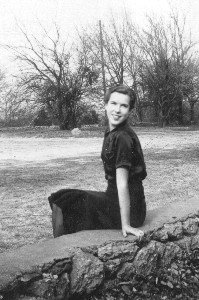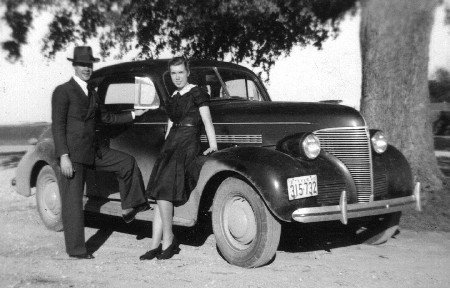
Julia in Waco, 1938
The work consisted of a rather rigid schedule, and I quickly learned that my grandmother was a strict taskmaster. Monday was wash day, and by 1937 we had an electric washing machine. It consisted of a tub, mounted on legs, with a dasher which agitated to beat the dirt out and a wringer mounted on one side. Hot water for the machine was heated in the house and carried outside to a washhouse. The wash was first put in the hot water and the machine agitated to clean the clothes, then guided by hand through the wringer into rinse water in a large tub, and lastly wrung by hand into another final rinse. In the final rinse, there would be bluing for white clothes or starch if there was wearing apparel such as shirts and dresses. I did not understand the alchemy, but white clothes would dry whiter if bluing was in the final rinse. The water drained from the washing machine by a hose attached at the bottom. The extra tubs had to have the water taken out by hand. Since our wash was usually quite large, there would be at least two times of filling and emptying involved. Everything was hung on the line to dry; if the weather was rainy or too cold, sometimes the Monday washday was postponed.
My job was to carry all the hot water, make the starch, and separate the wash into dark and light piles. Then I would load the machine, help with guiding the wash through the wringer, and on with the various other steps of cleaning and then hanging everything on the line. It was really a sight to see when the lines were full of clean wash waving in the breeze. This was an improvement over the method of cleaning which I had known previously, which began with a fire under a big, iron, water-filled wash pot outside. The washing had to be dipped out with a long stick, transferred to tubs for rinsing, and all wrung out by hand at every step of the way. In the four seasons in Texas there were days of blistering heat and days of bitter cold when it was a test of fortitude to adhere to the old axiom that "cleanliness is next to Godliness." However, under the tutelage of my grandmother I learned to be adept at this ritual, ending with bringing everything in off the line, folding and putting away sheets and towels, and sprinkling and rolling the starched items in towels, in preparation for ironing the next day.
 Julia in Waco, 1938 |
In addition to helping with the washing and ironing, I washed all the dishes, put them away, and swept the floor, all by hand. Thursdays and Fridays were usually easier days, but since my grandmother firmly believed in another axiom, that "idle hands were the Devil’s workshop,” I had to embroider cup towels, dresser scarves, pillowcases, and even some collars for dresses. The pattern for these could be obtained for a few cents at the dime store, where we could also buy fabric and embroidery thread. I am describing life during the summer, for when school started I did not work as much, because doing well with my studies meant that I could not be as helpful. On wash days, I still heated the water and took it out, but then had to leave to walk to school. I did the ironing after school.
When I first moved in with my grandparents, we had a living room, three bedrooms, a screened-in sleeping porch with a cot, a dining room, one bathroom, and a kitchen. I had a small room adjacent to the porch. Later, after my grandfather retired and there was only a small pension, things changed drastically. The living room was rented as a bedroom, and another bedroom was rented out also. These were for room-and-boarders who ate with us. Later too, when things got even tougher, my little room was converted into a small kitchen, so that the one bedroom and kitchen were rented to a couple. No matter how many we had living in the house, we shared the one bathroom. I slept on the cot on the porch and hung my clothes on a nail behind the door in the dining room. I kept other things under the cot. School became a refuge indeed.
While my list of chores varied according to the time of year, there was one day which never changed; this was Saturday. In preparation for Sunday, everything had to be thoroughly cleaned on Saturday. I was the one mainly responsible. The deal was that if I finished all the chores in a satisfactory manner, I could go to an afternoon movie and was given the ten cents it cost. If any part was not done well enough, I had to do it over and could not go to the movie. I learned one of the most important things in life: do it right the first time. I had to sweep the whole house. (After the roomers came, though, I did not do their rooms.) The rooms did not have carpets, so after sweeping I had to mop each one. This meant going back and forth from the kitchen sink to rinse the mop. I have seen a bucket of water used but it always seemed dirty to use the same water over and over. I dusted all the furniture, took all the scarves off the dressers and put on clean ones, gave the toilet and bathtub a thorough cleaning, emptied waste baskets, and took out the waste material and burned it in a large barrel my grandfather had fixed for that purpose. I cleaned the front porch using water from a hose. In my memory, that was a huge porch. I was amazed when I went back years later to discover it seemed to have shrunk. I make it all sound like a Cinderella story, but actually I learned to take pride in all I did. On Saturdays, it was nice to survey a clean house with the freshly starched and embroidered scarves on the dressers. My grandfather was a great gardener and had lots of different kinds of roses as well as other flowers. So in spring and summer I would arrange bouquets to put in the dining room and on the dressers.
After a few times of trying to shirk, I could always finish in time to get the movie, leaving home with a sense of mission accomplished. Of course, when we were getting ready for company on Sunday, the chores increased. There would be helping with killing and picking chickens, going to the store more often, and cleaning more pots and pans, so getting to the movie took second place. There were times when I got tired!
 Early in their relationship, Julia and Leon (who would later be her husband of 53 years), the shot taken in Waco about 1939. They are pictured next to his 1930s vintage automobile. |
That was then, and now the times have changed a great deal. Most people have refrigerators and freezers, often with on-door ice and water dispensers. They no longer have a messy need for defrosting. In the old days, the power had to be turned off while all the buildup of ice was melted and cleaned away, or else the engine would have to work too hard and would burn out.
Washing machines and dryers take the place of the washhouse and clothes lines. These are usually inside the home in their own room, and a water heater supplies the hot water both for washing and for all other needs, such as bathing. Otherwise, everyone takes the wash to a Laundromat where coins are deposited to operate the appliances.
A vacuum cleaner, also operated by electricity, sweeps up the dirt from the floors. More and more often, people are buying a vacuum cleaner which guides itself so that human hands do not have to do anything other than to plug it into an electric outlet and push the switch to start it.
Embroidered and starched doilies are things of the past, only occasionally used with antique furniture. Starching of anything is definitely out. Ironing is not done much anymore either, this quaint custom being supplanted with fabrics which don’t wrinkle. A few wrinkles are considered acceptable for all but the most formal occasions or jobs.
Shopping is primarily done in large stores which often combine grocery and other needs. The Sunday dinner with chicken which has been killed by the consumer is long gone for most everyone. The supermarket provides it all.
Porches too have gone the way of progress, deemed unnecessary in an age of air-conditioners, television, and the internet. Who has time to sit and chat on a porch with the bugs, heat, or cold?
What young person now would work at top speed most of the day in order to earn the price of a movie? And meals are often eaten out, reducing the chores at home even further. Saturday is more often the time to participate in recreation, take a trip, or go shopping. Many people get little exercise. Thus, the average person is more apt to pay for exercise, either at a gym, or in fees for various activities such as swimming or golf. Who is to say which is better in the long run? I have certainly been glad to see the workload dramatically decrease over the years. Yet now, partly to keep fit, I teach aerobics and so still exercise a great deal. I feel it is important to encourage everyone else to also find plenty of ways to stay in shape, even if they no longer are required to work so hard to do so.
(Thanks so much for this interesting then vs. now memoir, Julia. I remember when in the basement of our 121 E. Marshal St., Falls Church, VA, place (around 1947-early in 1951) you had one of those old fashioned wringer type clothes washing machines, plus two deep sinks for extra rinsing, I think, and even with the washer it seemed you were working really hard to get everything cleaned and wrung out and then on lines to dry. And we were then most of the time just three people, so the clothes load must have been relatively light. I think one of the big changes when we moved to a new house outside Omaha was that it had a modern clothes washer, but still the laundry was hung out in the midwest plains wind and sun to dry and billow like so many big or little sails straining to carry us off to sea. Larry)